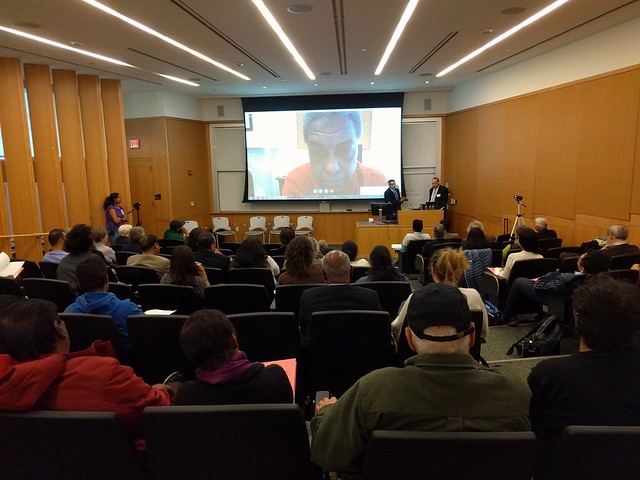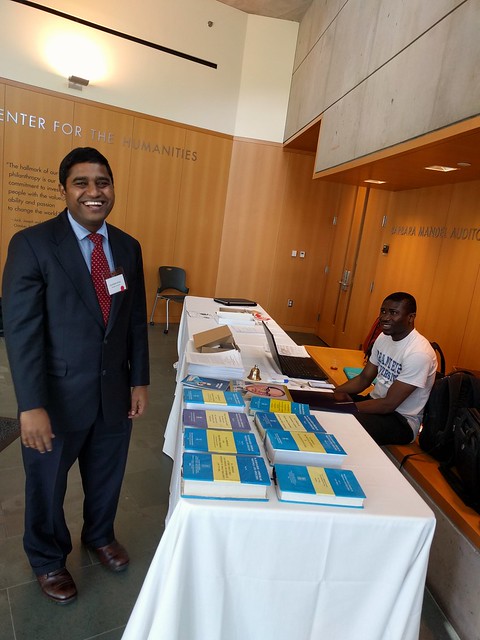By Anusha Chaitanya for TwoCircles.net
The three-day conference on Caste, Inequality and Economic Growth in South-Asia: Challenges of Tradition and Modernity was organized at Brandeis University from April 29t to May 1, 2016 chaired by professors Rajesh Sampath, Laurence Simon and Sukhadeo Thorat.
The conference attracted participation from academics and activists from different parts of India, Sri Lanka and Scotland apart from the US and brought scholarship and perspectives from across disciplines. Prof. Sukhadeo Thorat, who joined via Skype presented the keynote address at the beginning highlighting the dual need of addressing exclusion while also taking up measures for inclusion. In this direction, he mentioned the ongoing attempts to do so, among which has been the setting up of Centres for the Study of Social Exclusion and Inclusive Policy across universities in India. He further highlighted the importance of access to education and employment besides the focus on redistribution of resources such as land.
One of the key debates in the conference was around the current Ambedkarite student movements and agitations in higher educational institutions in India that caught public attention triggered by the institutional murder of Dalit PhD Scholar Rohith Vemula in Hyderabad Central University. Prof. Sujatha Surepally pointed out the need for anti-caste discrimination committees on campuses similar to anti-ragging and GSCASH, with proper implementation. These movements were further contextualized as a response to the growth of the Brahminical right while also highlighting the role of the Congress and Left political parties historically in saffronizing education.
The role of different ideologies and religion was highlighted by Tanoj Meshram and Pradeep Jayanak to better organize the anti-caste struggle and take it with full force among the youth. They further noted that political parties across the spectrum are currently embracing Dr.Babasaheb Ambedkar but their attempts have been mostly limited to symbolic appropriation rather than substantially engaging with his ideas and vision.
Going back further into history, Prof J. Balasubramaniam spoke about Dalit Ambedkarite journals in Colonial Madras to highlight the rise of Dalit political consciousness outside and apart from the nationalist movements during the colonial times, also as a result of education. Prof Anbuselvam raised an important point on the relation between the Panchayat Raj Act and the rise of caste based atrocities in southern districts of India, while also highlighting the importance of Dalit leadership in anti-caste movements.
Another important debate that the conference made space for was the comparative study of casteism and racism. Prof. Samuel Myers spoke about the constitutions of India and the US, highlighting the vision of Dr. Babasaheb Ambedkar in precisely yet inclusively framing the constitution of India unlike Thomas Jefferson, a slave owner who framed the constitution of the US where the lack of such precision resulted in defeating the purpose of social justice. Raju Kamble from Dr.Ambedkar International Mission spoke in detail about caste discrimination in the UK, US and Canada among the “Indian” diaspora highlighting the seriousness of the issue thus emphasizing the need to recognize it as a form of racial discrimination. Father Gideon Jebamani spoke about caste discrimination in Churches and Hindu temples in the US since the 1940s when Indian diaspora started entering the US.
Pushpa Iyer spoke about the Hardik Patel agitation. She contextualized it showing the reactionary nature of the demand for reservations for Patels, pointing out that Hardik Patel’s father was a former BJP worker and one of the accused of Gujarat genocide of 2002 Babu Bajrangi is one of Hardik Patel’s heroes. Arjun Kumar and Vibhor Saxena spoke about the supply side constraints faced by people from Scheduled Castes, Scheduled Tribes and minorities in accessing basic amenities such as LPG and schemes for housing and sanitation based on quantitative analysis of census and NSSO data.
The last day saw a vibrant debate on Ambedkar and nationalism which then opened discussions on what should be the vision of organizing and taking the anti-caste movement forward. The wide spectrum of perspectives with those closely and passionately engaged with Ambedkarite politics only emphasized the need to continue to have these discussions, thus closing the conference with the announcement of the next conference to be held in 2017 under the theme of the Unfinished Legacy of Dr. B.R. Ambedkar.



